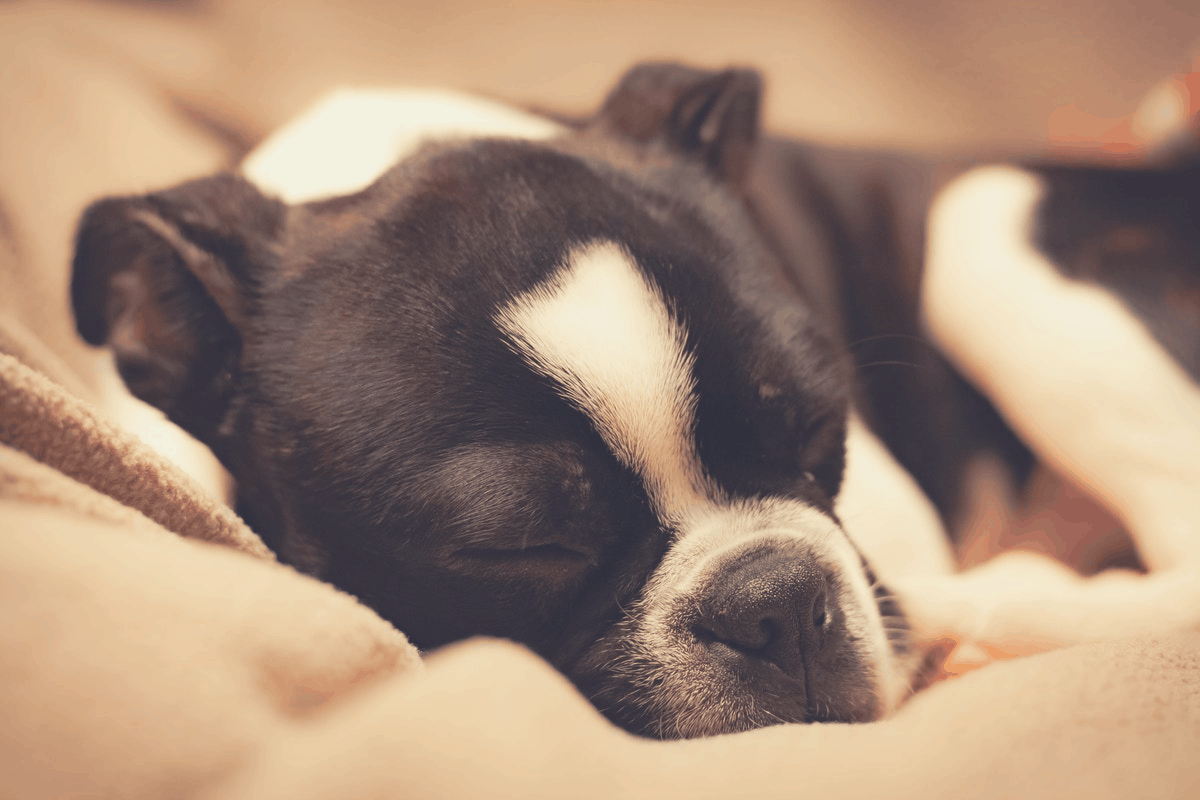Dogs have become synonymous with sleep due to their penchant for napping at all hours of the day. From puppies to matured ones and even older dogs, these pets spend the majority of the day in Dreamland.
Even in the most active environments with a lot of distractions, dogs still nod off every chance they get. They typically sleep throughout the night and take several naps during the day whenever their environment permits.
According to experts, the average pooch gets 12-14 hours of shuteye every single day.
This is why it is so distressing when dogs begin to show signs of insomnia. Not only can the inability to zoom into Dreamland affect their energy levels and overall quality of life but it may also disrupt other household members’ sleeping routines as well.
With your favorite canine barking and whining loudly throughout the night, even the heaviest sleepers may struggle to get enough rest. Thus, the probability of waking up stressed, grumpy, and disoriented can be high among everyone in the household and even neighbors.
This is why concerned owners seek the necessary treatment for their dogs as soon as a pattern of insomnia is established.
Giving your dog melatonin supplements, calming aids, and engaging in physically tiring fun games like tug of war at night can improve sleep. Massaging the canine’s stiff muscles, playing relaxing music, and creating a comfortable sleeping environment are additional ways to boost nighttime rest.
What Can I Give My Dog To Sleep At Night?
There could be many reasons why a once lazy sleepy dog is now struggling to get the necessary amount of shuteye. Here are a few nighttime sleep remedies for such pooches:
1. Tire It Out

The idlest dogs typically lie around all day with little to expend their energy on. This excessive energy levels in the body can interfere with the chances of shutting off into Dreamland at night and the result is a dog that is bored out of his mind but cannot drift off.
A smarter way to eliminate insomnia in such situations is to tire the dog out after arrival at home. Taking the beloved pooch for late-night walks or engaging in physically intensive fun games can do the trick.
For the best results, time the games such that it ends around 30 minutes before the dog’s regular sleeping time. This can give it some time to recover from the games and cool down its body temperature which often translates into a quick and deep shuteye.
Remember to include other pets such as cats in these games so you can tire all of them out to sleep. A few of the popular games you may engage in with your pooch includes:
- Tug of war
- Frisbee
- Flirt pole
- Bubble chasing
- Hide and seek
2. Massage Therapy
Body massages can be therapeutic for not only humans but pets such as dogs as well. The good news is that you do not need to be a professional masseuse to rub your favorite pooch into sleep after a rough day.
A couple of minutes of slow gentle strokes across the canine’s entire body is typically all you need to relax any tense muscles he may be experiencing. The feel of your hands can also provide soothing relief from pain that may be triggering anxiety.
For dogs that have been diagnosed with anxiety or another condition associated with pain, massaging with a muscle rub may be a smart idea. These creams work by warming up the dog’s muscles and joints followed by a cool lingering feeling that provides relief for even severe degrees of discomfort.
3. Turn On The Music
Music has been found to have numerous positive effects on a dog’s ability to sleep. According to studies, pooches found in animal shelters that play music experience lower breathing rates, reduced levels of the stress hormone cortisol, and even low incidences of barking and howling at night.
This is thanks to the therapeutic effects of music on stress and anxiety. Music is believed to be one of the most powerful natural treatments for sleeping disorders. While music therapy is popular for humans, only a few people are aware that it can have similar effects on dogs as well.
Classical Music, Reggae, and Soft Rock are genres that may provide maximum rewards for dogs battling insomnia and related conditions, according to Preventive Vet. If you decide to treat your dogs with music therapy, make sure to mix up the playlist every week.
This is because dogs get tired of hearing the same tracks over and over again which can spike up anxiety levels and worsen their insomnia. For instance, Reggae fans can mix up a bit of Bob Marley, UB40, and Jimmy Cliff in conjunction with other musicians at different times. This may do the canine’s sleeping abilities a lot of good.
4. Melatonin Supplements Are King
Melatonin is the hormone that stimulates when the body drifts off. It sends signals to the brain to begin the shuteye process by slowing down the heart rate, lowering the temperature, and undertaking additional measures to kick start the sleep process.
According to experts, insomnia is typically caused by cognitive dysfunctions that disrupt the dog’s natural sleep cycle. This may lead to abnormally high amounts of the stress hormone cortisol even at night when it is supposed to be at the lowest levels.
Melatonin supplements can help restore the natural sleep cycle so pooches may get more sleep at night and stay active during the daytime. These popular supplements can also help reverse the effects of Cushing’s Disease, a condition that triggers excessive amounts of cortisol production in dogs.
5. Dog Calming Supplements
Anxieties and fears are common in canines of all breeds which is why calming aids have become so popular on the market. These aids typically come in the form of chews and tablets while others are also available in forms such as jackets, wraps, sprays, and plug-in diffusers.
Calming supplements may contain ingredients such as L-theanine and L-tryptophan – 2 amino acids known for supercharging relaxation and lowering the stress response. Others may contain popular herbs with sedative effects such as Chamomile and Valerian Root.
If you live in a state where CBD oils are legal, they can also be a great alternative thanks to their renowned calming effects.
The Helopssa Hemp Calm Treats for Dogs from Amazon helps reduce my beloved canine’s anxiety for better sleep whenever he gets restless. It ships with 180 chews which helps reduce barking, stress, and other signs of misbehavior. It has been a game-changer for my dog ever since I found it online.
6. Create A Routine
Dogs love sleep routines because, like humans, their bodies adjust and fare better when there’s a specific timeline to follow at night. Sometimes, a dog may be suffering insomnia just because of the lack of a specific routine.
Thus, creating an iron-cast timeline of when to sleep and which activities are undertaken before bedtime may be all it takes to get your favorite pooch sleeping again. Toilet breaks just before the dog sleeps should be incorporated into the sleep routine for the best results.
The last thing you need is a dog staying awake the whole night because of a full bladder.
7. Create A Comfy Sleeping Environment
Sometimes, the reason why a dog struggles with insomnia is the lack of a comfortable environment. If your pooch is being forced to sleep on a mediocre bed or nighttime environment that is too cold or too hot then it is only logical that insomnia kicks in.
A good dog bed featuring comfortable cushioning can be an important first step. If the current one is showing signs of dips and sags, it is time to order a new one. Warm blankets may also come in handy especially during cold periods of the year.
8. Contact Your Vet
Your Vet should be the last point of call if a dog is showing signs of unexplained insomnia, particularly when you’re struggling to find the underlying reasons yourself. Sometimes, sleep disorders may be behind the pooch’s inability to get a good night of rest.
The good news is that your Vet can run the necessary tests to figure out what may be wrong with the dog so the right treatment is prescribed. Sometimes, these treatments may even be lifesaving in addition to treating the dog’s sleep struggles.
In the case of physical injuries that could be causing pain and discomfort, the Vet will typically prescribe pain medications that can provide soothing relief, reduce anxiety, and stimulate improved nighttime rest.
9. Do Not Entertain Nighttime Play
Some dogs may be naturally predisposed to nighttime play and encouraging this habit in any way can lead to long-term insomnia. The best way to respond is not to respond at all as that will make it clear to the dog that the whines and barks will not disturb your sleep.
Sure, it can be annoying not to do anything while the dog continues to misbehave at night but that may be rewarding in the long-term. Giving any sort of attention will only reinforce the dog’s behavior.
If the whines are being too distracting, noise-canceling headphones or earplugs can come in handy.
I personally use the Cowin E8 Active Noise-Canceling Headphones from Amazon to doze off in noisy environments. It features amazing technology that drowns out background noises so I can focus on listening to relaxing pleasant sounds for satisfying sleep.
9. Keep Their Crates Close By
Keeping your dog’s crate close by can be a smart way to eliminate sleep problems caused by separation anxiety. For dogs that are used to spending the night in the same bed with their owners, kicking them out completely to a separate bedroom may trigger significant anxiety and restlessness.
This is why keeping the crate close is recommended because it can offer a sense of reassurance to the dog that it is in a safe environment. This can reduce anxiety levels and stimulate the ability to nod off in the long run.
The Midwest Homes for Pet Dog Crate from Amazon provides a safe and secure shelter for my dogs indoors and outdoors. It features a convenient divider panel that allows the crate to expand as your dog gets bigger. It is highly recommended for every dog owner.
Conclusion
There could be several reasons why your dog may be struggling to sleep at night and often, getting to the root of the problem can be the key to finding a solution. That being said, various aids can be given to the dog to eliminate the symptoms of insomnia and boost the ability to sleep.
This may include melatonin supplements and dog calming aids in the forms of chews and toys. CBD oils have also shown spectacular results in cities where they can be legally purchased. Additionally, physically intensive games such as tug of war, hide n seek, and chasing water bubbles can tire out the dog and put him to sleep.
